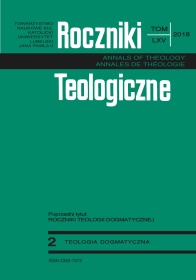Św. Tomasz – doctor gratiae? Prymat łaski Bożej u św. Tomasza z Akwinu w świetle szesnastowiecznej polemiki wyznaniowej
Abstrakt
Artykuł ma na celu wydobycie tych elementów nauki św. Tomasza o konieczności łaski Bożej, które dotyczą kwestii fundamentalnych dla późniejszego odrzucenia nauki katolickiej przez Marcina Lutra. Analiza opinii Lutra na temat teologii scholastycznej oraz tez św. Tomasza odnoszących się do konieczności łaski wskazuje, że Luter prawdopodobnie nie znał oryginalnej myśli Tomaszowej. Artykuł składa się z dwóch części. Pierwsza jest poświęcona temu, czy Luter, odrzucając scholastykę, zanegował także myśl Tomaszową. Z kolei w części drugiej omawiane są te tezy św. Tomasza na temat konieczności łaski Bożej, które – pozbawione polemicznego wydźwięku – zbiegają się z pewnymi teologicznymi intuicjami Lutra.
Bibliografia
Bayer Oswald, Martin Luther’s Theology. A Contemporary Interpretation, tłum. T.H. Trapp, Eerdmans, Grand Rapids 2007.
Gilbert Paul P., Wprowadzenie do teologii średniowiecza, tłum. T. Górski, WAM, Kraków 1997.
Hödl Ludwig, „Lumen gratiae”. Ein Leitgedanke der Gnadentheologie des Thomas von Aquin, w: Mysterium der Gnade. Festschrift für Johann Auer, red. H. Roßmann, J. Ratzinger, Pustet, Regensburg 1975, s. 238-250.
Janz Denis Raymond, Luther and Late Medieval Thomism. A Study in Theological Anthropology, Wilfrid Laurier University Press, Waterloo 1983.
Kraus Georg, Nauka o łasce – zbawienie jako łaska, tłum. W. Szymona, Wydawnictwo M, Kraków 1999.
Lienhard Marc, L’Évangile et l’Église chez Luther, Cerf, Paris 1989.
Lorda Juan Luis, Łaska Boża, tłum. J. Lekan, KUL, Lublin 2012.
McGrath Alister E., Luther’s Theology of the Cross. Martin Luther’s Theological Breakthrough, Blackwell, Malden 2004.
O’Callaghan Paul, Luther and „sola gratia”: The Rapport between grace, human freedom, good works and moral life, „Scripta Theologica” 49(2017), nr 1, s. 193-212.
Pelikan Jaroslav, Tradycja chrześcijańska. Historia rozwoju doktryny, t. 3: Rozwój teologii średniowiecznej (600-1300), tłum. J. Pociej, UJ, Kraków 2009.
Pesch Otto Hermann, Zrozumieć Lutra, tłum. A. Marniok, K. Kowalik, W drodze, Poznań 2008.
Składanowski Marcin, Marcin Luter – świadek Chrystusa i nauczyciel wiary? Ekumeniczne katolicko-luterańskie spojrzenie na Reformatora w świetle dokumentu „Od konfliktu do komunii”, „Studia Teologiczne Białystok, Drohiczyn, Łomża” 33(2015), s. 65-79.
Sobór Trydencki, Decretum de iustificatione. Dekret o usprawiedliwieniu (13 stycznia 1547 r.), w: Dokumenty soborów powszechnych, t. 4: (1511–1870): Lateran V, Trydent, Watykan I, opr. A. Baron, H. Pietras, WAM, Kraków 2004, s. 288-319.
Sobór Watykański II, Deklaracja o wychowaniu chrześcijańskim Gravissimum educationis (28 października 1965 r.).
Sobór Watykański II, Dekret o formacji kapłańskiej Optatam totius (28 października 1965 r.).
[Thomas Aquinas], Sancti Thomae Aquinatis Ordinis Praedicatorum Doctoris Angelici et Communis omnium scholarum Catholicarum Patroni Summa Theologica de novo edita cura et studio Collegii Provinciae Tolosanae eiusdem Ordinis apud S. Maximinum, Andreas Blot, Parisiis1926.
Copyright (c) 2018 Roczniki Teologiczne

Utwór dostępny jest na licencji Creative Commons Uznanie autorstwa – Użycie niekomercyjne – Bez utworów zależnych 4.0 Międzynarodowe.





